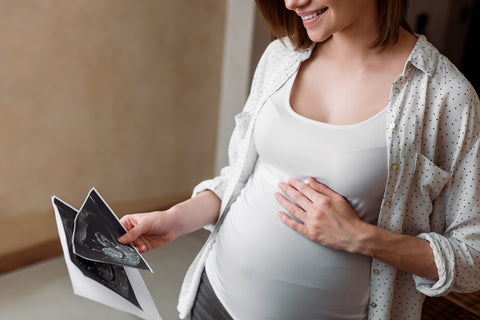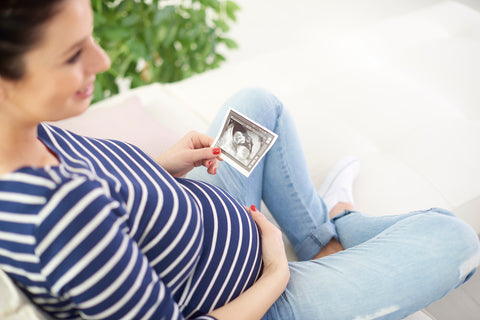If you recently found out that you’re expecting a child, congratulations!
Whether it’s your first child or your fifth, you probably have a lot of questions that you want to be answered.
Some of these questions might involve weight gain and body fat, especially if you had an overweight or obese frame in your pre-pregnancy days.
One question many overweight women who are expecting might ask is what exactly happens to your body fat as your fetus grows?
They might also wonder whether they should watch their weight during their pregnancy or become overly concerned with weighing themselves during this time. Smart Scale That Measures Baby's Growth
What Happens To Existing Fat?
The belly fat gets stretched out over the growing baby pretty evenly.
See Related: What Is Your BMI?
While this blog post will go into a lot more detail on this topic, the short answer is that unless you were significantly obese before your first trimester, the vast majority of expectant mothers don’t have a lot to worry about when it comes to gaining weigh.
But just because overweight women who are expecting shouldn’t be overly concerned with their BMI, it doesn’t mean that you should give zero thought to the issue.
Gaining too much weight and adding excess amounts to your body fat stores could become problematic if this goes unchecked.
But by working closely with your doctor all throughout your pregnancy, the chances of you birthing a healthy baby will increase.
Expectant mothers who are concerned about their weight in terms of both their pre-pregnancy BMI will appreciate the Beebo.
They will also appreciate how the Beebo let's them track their growing bump both during pregnancy and once they are holding their precious infant.
Will People Know I'm Pregnant If I'm Overweight?
Body Shape Changes During Pregnancy

As your little baby grows, your uterus will grow to extend beyond your pelvic region in the second trimester.
Most women will first start to appear pregnant between 12 - 16 weeks. But if you already had a significant amount of abdominal fat that was present before you conceived, your baby bump might take a bit longer to become apparent.
Just how much weight you should gain during pregnancy will largely depend on your BMI before you got pregnant.
Expectant mothers who have a pre-pregnancy BMI between 25 and 29.9 are considered to be overweight.
Women who fall under this category should only gain between 15 to 25 pounds during the gestation period.
Expecting women who have a BMI of at least 30 are considered obese. Women in this particular category should gain no more than 20 pounds during their pregnancy.
Expectant mothers who carry twins should double these figures for their own situation.
Why Overweight Pregnant Women Should See a Doctor

Women in this category should see their doctor right away.
That’s because it’s important to get the very first ultrasound really early in the process.
Healthcare providers might have a harder time dating the pregnancies of overweight and obese women.
This is due to the fact that for expectant women who are overweight or obese, ovulation can become a lot more erratic.
Plus, some of the ways that your doctor would determine your due date could become harder to read for several reasons. These reasons include the presence of extra abdominal fat.
During your first pregnancy appointment, your doctor will want to measure your body mass index.
At this time, your physician will also want to test you for gestational diabetes due to your excess weight. If this test comes back positive, you will need to look after your blood sugar levels at home. If the test comes back negative, your doctor will still need to test your urine for protein levels at subsequent visits. You will also likely get tested again for gestational diabetes later on during your pregnancy.
Pregnancy Weight Gain Guidelines
Many pregnant women worry a lot about weight gain during this period in their lives. But any healthy pregnancy involves quite a bit of weight gain. The guidelines for weight distribution on an average-sized pregnant woman is as follows:
- Baby: 7 - 7.5 pounds
- 2 pounds of amniotic fluid
- 4 pounds of blood
- 4 pounds of body fluids
- Breasts: 2 pounds
- Protein, fat, and other nutrients: 7 pounds
- 1.5 pounds of placenta
- Uterus: 2 pounds

Weight Gain During Pregnancy
Most doctors don’t recommend pregnant women who are overweight or obese to lose weight during their pregnancy.
Instead, their focus should stay on getting enough nutrients through a healthy diet at this time.
Your doctor might also suggest finding ways to be physically active throughout your first, second, and third trimester.
Health experts state that expectant mothers who are at least 60 pounds overweight will probably not need to gain a ton of weight during their pregnancy.
Your baby will be able to use the existing fat stores on your body for their energy needs.
However, certain studies do show that overweight or obese women who gain less than the recommended amount of weight during their pregnancy might have a slightly lower chance of experiencing pregnancy complications such as a larger baby or needing to undergo a C-section.
Overweight and obese women who are expecting should definitely talk to their healthcare provider about the amount of weight they should gain during their pregnancy. The actual number will largely depend on a lot of individualized factors.
Staying Healthy While Pregnant

Take a prenatal vitamin: Ensure that you get the proper levels of calcium and folic acid. Some of the foods that you can eat for folic acid include spinach, broccoli, and beans. Milk and spinach act as great sources of calcium.
Get enough sleep: Get at least 7 hours of sleep a night. This is of the utmost importance for you and your baby.
Try not to get too stressed: To improve your child’s birth outcomes, it’s vital that you try to reduce your stress levels whenever possible. Get your loved ones involved. A team effort in this area could lead to better results.
FAQs
180 Pounds And Pregnant When Will I Whow?
A petite woman who is about 5’4’’ and 180 pounds can expect to show her expectant mother status between 22 - 28 weeks.
I'm Size 18 When Will I Look Pregnant?
Most first time mothers say that they start to show between 12 - 18 weeks. With subsequent pregnancies, they’ll start to show around the 6 -18 week mark.
But plus-sized women might have to wait a bit longer before they start to show. How long that will be will depend on a lot of individual factors.
Unless you were dealing with a significant obesity issue during your pre-pregnancy days, you probably won’t have to worry too much about excess weight gain.
But it still might be a good idea to keep track of any weight gained as you progress through your pregnancy.
The Fit Track Beebo Body Fat Scale can help you keep tabs on your baby's development.
Since it’s compatible with both Android and Apple devices, keeping track of characteristics such as body mass index has never been easier.








